18 start with D start with D
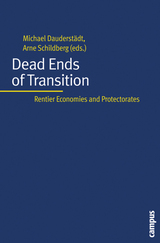

Using a comparative case study method, Scott examines the historical, intellectual, and ideological origins of the Reagan Doctrine as it was applied to Afghanistan, Angola, Cambodia, Nicaragua, Mozambique, and Ethiopia. Scott draws on many previously unavailable government documents and a wide range of primary material to show both how this policy in particular, and American foreign policy in general, emerges from the complex, shifting interactions between the White House, Congress, bureaucratic agencies, and groups and individuals from the private sector.
In evaluating the origins and consequences of the Reagan Doctrine, Deciding to Intervene synthesizes the lessons that can be learned from the Reagan administration’s policy and places them within the broad perspective of foreign policy-making today. Scott’s measured treatment of this sensitive and important topic will be welcomed by scholars in policy studies, international affairs, political science, and history, as well as by any reader with an interest in the formation of American foreign policy.
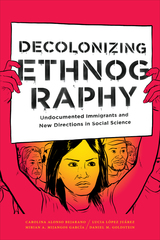
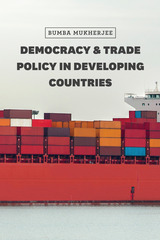
Mukherjee offers the first comprehensive cross-national framework for identifying the specific economic conditions that influence trade policy in developing countries. Laying out the causes of variation in trade policy in four developing or recently developed countries—Brazil, India, Indonesia, and South Africa—he argues persuasively that changing political interactions among parties, party leaders, and the labor market are often key to trade policy outcome. For instance, if workers are in a position to benefit from opening up to trade, party leaders in turn support trade reforms by decreasing tariffs and other trade barriers.
At a time when discussions about the stability of new democracies are at the forefront, Democracy and Trade Policy in Developing Countries provides invaluable insight into the conditions needed for a democracy to survive in the developing world in the context of globalization.
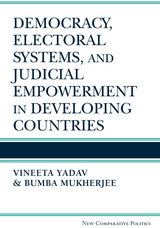
Moving next to de facto independence, Yadav and Mukherjee bring together data from 103 democracies in the developing world, complemented by case studies of Brazil, India, and Indonesia. Honing in on the effects of electoral institutions, the authors find that, when faced with short time horizons, governments that operate in personal vote electoral systems are likely to increase de facto judicial independence whereas governments in party-centered systems are likely to reduce it.
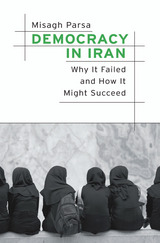
The Green Movement protests that erupted in Iran in 2009 amid allegations of election fraud shook the Islamic Republic to its core. For the first time in decades, the adoption of serious liberal reforms seemed possible. But the opportunity proved short-lived, leaving Iranian activists and intellectuals to debate whether any path to democracy remained open.
Offering a new framework for understanding democratization in developing countries governed by authoritarian regimes, Democracy in Iran is a penetrating, historically informed analysis of Iran’s current and future prospects for reform. Beginning with the Iranian Revolution of 1979, Misagh Parsa traces the evolution of Iran’s theocratic regime, examining the challenges the Islamic Republic has overcome as well as those that remain: inequalities in wealth and income, corruption and cronyism, and a “brain drain” of highly educated professionals eager to escape Iran’s repressive confines. The political fortunes of Iranian reformers seeking to address these problems have been uneven over a period that has seen hopes raised during a reformist administration, setbacks under Ahmadinejad, and the birth of the Green Movement. Although pro-democracy activists have made progress by fits and starts, they have few tangible reforms to show for their efforts.
In Parsa’s view, the outlook for Iranian democracy is stark. Gradual institutional reforms will not be sufficient for real change, nor can the government be reformed without fundamentally rethinking its commitment to the role of religion in politics and civic life. For Iran to democratize, the options are narrowing to a single path: another revolution.

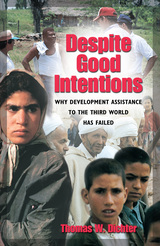
To make his case, Dichter reviews the major trends in development assistance from the 1960s through the 1990s, illustrating his analysis with eighteen short stories based on his own experiences in the field. The analytic chapters are thus grounded in the daily life of development workers as described in the stories.
Dichter shows how development organizations have often become caught up in their own self-perpetuation and in public relations efforts designed to create an illusion of effectiveness. Tracing the evolution of the role of money (as opposed to ideas) in development assistance, he suggests how financial imperatives have reinforced the tendency to sponsor time-bound projects, creating a dependency among aid recipients. He also examines the rise of careerism and increased bureaucratization in the industry, arguing that assistance efforts have become disconnected from important lessons learned on the ground, and often lessons of world history.
In the end, Dichter calls for a more light-handed and artful approach to development assistance, with fewer agencies and experts involved. His stance is pragmatic, rather than ideological or political. What matters, he says, is what works, and the current practices of the development industry are simply not effective.
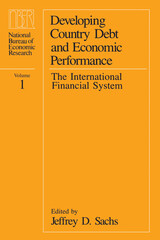
This project on developing country debt, undertaken by the National Bureau of Economic Research, provides a detailed analysis of the ongoing developing country debt crisis. The project focuses on the middle-income developing countries, particularly those in Latin America and East Asia, although many lessons of the study should apply as well to other, poorer debtor countries. The project analyzes the crisis from two perspectives, that of the international financial system as a whole (volume 1) and that of individual debtor countries (volumes 2 and 3).
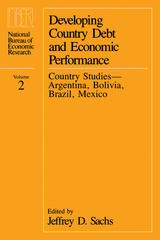
This project on developing country debt, undertaken by the National Bureau of Economic Research, provides a detailed analysis of the ongoing developing country debt crisis. The project focuses on the middle-income developing countries, particularly those in Latin America and East Asia, although many lessons of the study should apply as well to other, poorer debtor countries. The project analyzes the crisis from two perspectives, that of the international financial system as a whole (volume 1) and that of individual debtor countries (volumes 2 and 3).
This second volume contains lengthy and detailed case studies of four Latin American nations—Argentina, Bolivia, Brazil, and Mexico—providing a wealth of comparative data and new statistics on the general economic development of each nation. The authors explore the various factors that contributed to the debt crisis in each country and analyze how the crisis was managed once it had taken hold. Trenchant economic analyses are enchanced by assessments of the stark political realities behind the policy choices facing each nation.
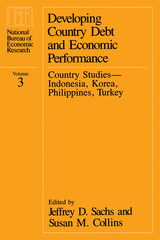
This project on developing country debt, undertaken by the National Bureau of Economic Research, provides a detailed analysis of the ongoing developing country debt crisis. The project focuses on the middle-income developing countries, particularly those in Latin America and East Asia, although many lessons of the study should apply as well to other, poorer debtor countries. The project analyzes the crisis from two perspectives, that of the international financial system as a whole (volume 1) and that of individual debtor countries (volumes 2 and 3).
This third volume contains lengthy and detailed case studies of four very different Asian countries—Turkey, Indonesia, Korea, and the Philippines.
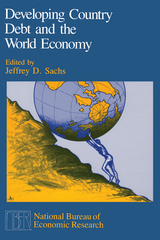
Developing Country Debt and the World Economy contains nontechnical versions of papers prepared under the auspices of the project on developing country debt, sponsored by the National Bureau of Economic Research. The project focuses on the middle-income developing countries, particularly those in Latin America and East Asia, although many lessons of the study should apply as well to other, poorer debtor countries. The contributors analyze the crisis from two perspectives, that of the international financial system as a whole and that of individual debtor countries.
Studies of eight countries—Argentina, Bolivia, Brazil, Indonesia, Mexico, the Philippines, South Korea, and Turkey—explore the question of why some countries succumbed to serious financial crises while other did not. Each study was prepared by a team of two authors—a U.S.-based research and an economist from the country under study. An additional eight papers approach the problem of developing country debt from a global or "systemic" perspective. The topics they cover include the history of international sovereign lending and previous debt crises, the political factors that contribute to poor economic policies in many debtor nations, the role of commercial banks and the International Monetary Fund during the current crisis, the links between debt in developing countries and economic policies in the industrialized nations, and possible new approaches to the global management of the crisis.

P. T. Bauer is a pioneer: from the outset his studies and reflections about economic development led him to conclusions that diverge from the mainstream. The Development Frontier illustrates his characteristic approach, in which economic analysis is allied with careful observation of the economic scene and economic processes in the less developed world. The book is further enriched by his understanding of the interplay between social and political factors and forces conventionally regarded as falling within the purview of economics.
One of Bauer's central themes is the crucial importance of traders in transforming subsistence and near-subsistence economies into exchange economies. In contrast to the conventional view that traders are parasitic, Bauer views them as productive: they encourage new wants, convey information about new opportunities, and help producers take advantage of these opportunities. Other major topics include internal trade in less developed countries, occupational distribution and economic advance, Third World debt, price and income stabilization of primary producers, and official resource transfers (foreign aid).
Bauer presents arresting insights and graphic illustrations. He challenges the preconceptions and attitudes of nonspecialists and specialists alike, whether he is writing about the role of traders, the population explosion, Hong Kong, or the views of the late Sir John Hicks on economic history.

Just as trade, finance, information, and technologies are moving rapidly across borders, so too have labor markets and transnational migrant communities. Migrants are sending large quantities of money back to their countries of origin in the form of philanthropy, remittances, and commercial investments. They are also sharing knowledge and skills learned or developed abroad. Is greater global equity an inevitable consequence of such diaspora philanthropy, or can this giving actually aggravate inequity? Diasporas and Development examines the positive—and sometimes negative—impacts of diaspora engagement in Africa, Asia, Central America, and the Caribbean.
How can the equity impact of this global giving be maximized? Might creative intermediary mechanisms or public policies help channel diaspora philanthropy in positive directions? They also explore motivations for the dark sides of diaspora engagement such as support for extremist organizations, organized crime, ethnic violence, and even civil war. Diasporas and Development aims to deepen the understanding of the promise and pitfalls of diaspora philanthropy and how it might help bridge the distances between societies in an unequal world.
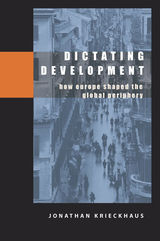
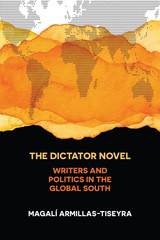
The Dictator Novel positions novels about dictators as a vital genre in the literatures of the Global South. Primarily identified with Latin America, the dictator novel also has underacknowledged importance in the postcolonial literatures of francophone and anglophone Africa. Although scholars have noted similarities, this book is the first extensive comparative analysis of these traditions; it includes discussions of authors including Gabriel García Márquez, Ngũgĩ wa Thiong’o, Alejo Carpentier, Augusto Roa Bastos, Domingo Faustino Sarmiento, José Mármol, Esteban Echeverría, Ousmane Sembène , Chinua Achebe, Aminata Sow Fall, Henri Lopès, Sony Labou Tansi, and Ahmadou Kourouma. This juxtaposition illuminates the internal dynamics of the dictator novel as a literary genre. In so doing, Armillas-Tiseyra puts forward a comparative model relevant to scholars working across the Global South.

With style and imagination, this iconoclastic work covers the major issues in development economics. In eight carefully reasoned essays, P. T. Bauer challenges most of the accepted notions and supports his views with evidence drawn from a wide range of primary sources and direct experience.
The essays were selected on the basis of their interest to students and general readers from Bauer's book, Dissent on Development: Studies and Debates in Development Economics. Reviewing the previous work, the Wall Street Journal wrote: "It could have a profound impact on our thinking about the entire development question... Quite simply, it is no longer possible to discuss development economics intelligently without coming to grips with the many arguments P. T. Bauer marshalled in this extraordinary work."
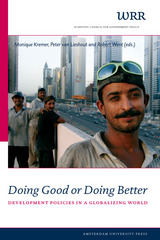
What drives development? What new issues have arisen due to globalization? And what kind of policies contribute to development in a rapidly changing world? The studies in Doing Good or Doing Better analyze the different development strategies employed on various continents, address current challenges, and argue that a new approach—one different from the European and American models—is necessary in a globalizing, interdependent world.
READERS
Browse our collection.
PUBLISHERS
See BiblioVault's publisher services.
STUDENT SERVICES
Files for college accessibility offices.
UChicago Accessibility Resources
home | accessibility | search | about | contact us
BiblioVault ® 2001 - 2024
The University of Chicago Press









